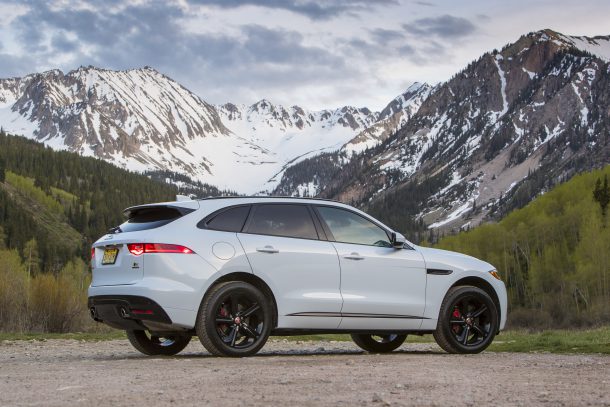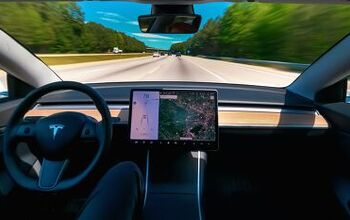Stop Being So Mean to Diesels, Pleads Jaguar Land Rover Boss

Ralf Speth isn’t having it. Across Europe governments are cracking down on the use of diesel vehicles in a bid to lower air pollution, especially in the Jaguar Land Rover CEO’s own country. London has announced plans to levy stiff charges on anyone driving a diesel-powered vehicle through central areas of the capital starting in early 2019, adding fuel to the anti-diesel fire. Paris, Berlin and Athens also plan to ban the technology.
With compression ignition still a significant part of the automaker’s engine lineup — both in Europe and North America — Speth recently defended the technology’s importance in a finger-pointing spiel. The world needs diesel, he claimed, and the media (and Volkswagen) haven’t done anything to help the situation.
Speaking to UK’s Autocar, Speth claimed the need for improvements in diesel technology are crucial for his company and the broader industry. Jaguar Land Rover plans to ramp up messaging about the benefits of modern diesels.
“The latest diesel technology is really such a step in emissions, performance, particulates; it’s better for the environment when compared to [an equivalent] petrol,” Speth said. “Diesel has to – needs to – have a future.”
As diesels form the backbone of commercial and transit fleets the world over, more work is needed to keep it viable in the face of ever-stricter emissions regulations, the CEO remarked. However, the challenge doesn’t come solely from lawmakers — public perception has taken a huge hit. Speth implied the media has played a role in certain misconceptions by combining images of chugging oil burners of yesteryear with cleaner modern vehicles.
“Anyone can see the black smoke coming out of old diesels is bad. We need to replace them with newer ones,” he said.
There’s some truth to Speth’s remarks, as anyone near the media industry knows a sooty tailpipe from a 1980s-vintage diesel makes for a great image to lead off a segment. Many will remember the college professor with the fearsomely slow inline-six Volvo 240 diesel or, if they grew up in America, the rattling Oldsmobiles diesels of 35 years ago.
Media aside, Speth blames Volkswagen’s emissions cheating for kicking off the current war against the technology.
“Nobody believes the automotive industry anymore,” he said. “They see us as offenders and not giving the right information. We have to show our technology is the best you can buy, to reduce the damage to health and the environment.”
Speth claims banning diesels from cities and attempting to usher them out of the marketplace will end up shooting environmentalists and regulators in the foot. While the future of the industry lies in electrification, the diesel backlash is harming emissions targets by spurring a return to gasoline engines, he said.
In addition to more lenient rules against gasoline cars, the London plan will see diesel vehicles that don’t meet new Euro 6 emissions standards fined £12.50 ($16.23 USD) to drive through central London. Buses and commercial trucks would pay about $130 per trip. Put another way, that’s a $16 one-way fine for the technology in a five-year-old car.
Continued advancement of Jaguar diesel technology would certainly garner applause from auto journos, many of whom haven’t taken too kindly to the diesel F-Pace and XE.
[Image: Jaguar Land Rover]

More by Steph Willems
Latest Car Reviews
Read moreLatest Product Reviews
Read moreRecent Comments
- Ltcmgm78 Imagine the feeling of fulfillment he must have when he looks upon all the improvements to the Corvette over time!
- ToolGuy "The car is the eye in my head and I have never spared money on it, no less, it is not new and is over 30 years old."• Translation please?(Theories: written by AI; written by an engineer lol)
- Ltcmgm78 It depends on whether or not the union is a help or a hindrance to the manufacturer and workers. A union isn't needed if the manufacturer takes care of its workers.
- Honda1 Unions were needed back in the early days, not needed know. There are plenty of rules and regulations and government agencies that keep companies in line. It's just a money grad and nothing more. Fain is a punk!
- 1995 SC If the necessary number of employees vote to unionize then yes, they should be unionized. That's how it works.































Comments
Join the conversation
When I hired a car in Ireland several years ago the Diesel cars were the premium rentals. I got a Ford Mondeo for 10 days and fell in love with it. The Mondeo finally showed up here in Canada as the Ford Fusion but I don't know if it could be had with a manual like my Irish hire car. Unfortunately the hood was bolted down on the Mondeo but I think it was a 2.0L 4-holer. What a great car that was.
No matter how you slice it, diesels have little or nothing to do with the future of automobiles. What part of "oil burner" don't you understand?? Until someone or technology fixes that part and the filthy junk that leaves the exhaust valves, it's just not happening. But then they wouldn't be "diesels" anymore.